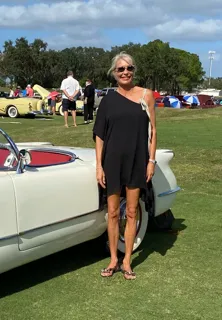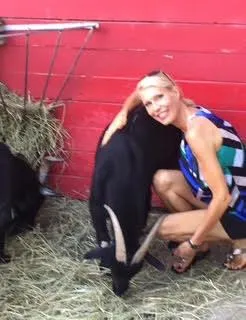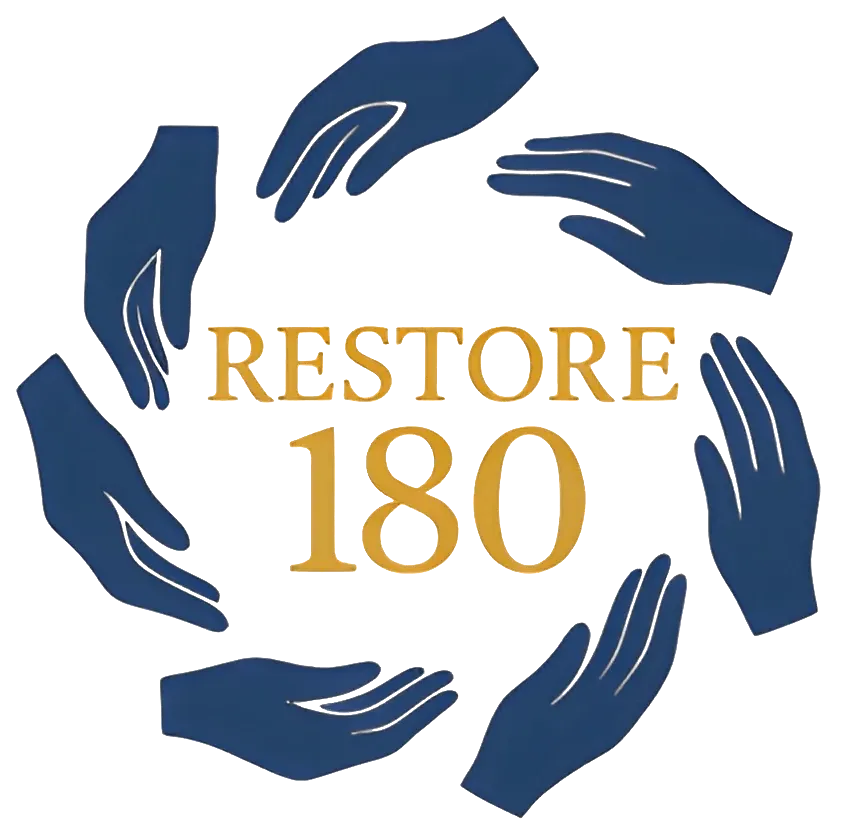About Restore180
Foundation
Turning Pain Into Purpose, One Life at a Time
Restore180 is a trauma recovery foundation committed to helping people rebuild after life- altering experiences. We fund access to therapy, peer support, and healing education nationwide—restoring lives, renewing hope, and reshaping futures.
Our mission is rooted in compassion and action. We believe that no one should walk through pain alone, and that healing becomes possible when we meet people exactly where they are—with dignity, honesty, and grace. From scholarships to crisis grants, group support to national training programs, we’re leading a movement that puts recovery within reach for everyone.
About the Founder —
Chelsea Elizabeth

Confident, driven, and resilient—with entrepreneurial instincts and a clear vision for both personal and professional growth—I’ve spent my career leading companies through seasons of rapid, sustained success. I’m a six-time President’s Club honoree, Top 5% producer, and member of the Who’s Who of business leaders. As a corporate executive and keynote speaker, I’ve taken the stage at three global conferences, and two of my published training guides remain in active circulation today.
In every chapter of my journey, I’ve delivered results that have helped revolutionize how companies thrive in competitive markets. But my greatest passion lies in consulting, speaking, writing, and coaching others to rise above what they thought possible. My latest achievement is my memoir—a raw, unfiltered account that dares to challenge the ways we hide behind masks and confining labels just to make others comfortable.
In a single, brutal moment, a fatal attack shattered not only my body but the carefully constructed life I had built—a life filled with love, purpose, routine, and relentless ambition. Everything familiar vanished. The physical pain was only the beginning. I was thrust into a world where I had to rebuild from nothing, navigating trauma, PTSD, chronic pain, and emotional isolation. And I had to do it while the world around me kept spinning—friends moved on, time didn’t pause, and life refused to wait.
My book is not just a retelling of tragedy—it’s a journey through recovery. It unpacks the physical, emotional, and psychological fallout of surviving the unthinkable. I confront the grueling aftermath—multiple surgeries, overwhelming medical debt, flashbacks that steal your sleep, and the societal discomfort around real, enduring pain. I reveal how public sympathy is often fleeting, and how people’s desire to “move on” too quickly can be just as isolating as the trauma itself.
But at its core, this book is about reclaiming self. It’s about grieving your own death while still alive, accepting that healing isn’t about returning to who you were—it’s about becoming someone new. I share what it looks like to live authentically in the aftermath, to choose vulnerability in a world that celebrates masks, and to build connection from the raw places that hurt the most.
Through sharing my own story, I’ve created a space where others can finally say: “I’m not okay.” My mission isn’t to promote a book—I don’t even have a publisher yet. My mission is to help people find their honest voice, embrace their brokenness, and discover that healing is possible. I want to normalize trauma, humanize emotion, and create safe spaces where no one has to suffer in silence.
What I learned is that trauma isn’t just the event—it’s everything that follows. It’s the people who leave, the ones who come only to take, and the rare few who stay and help you rise again. Behind every recovery story are people, and that’s where true healing begins. If you’ve ever felt like the world moved on without you, if you’ve ever worn a smile to survive while breaking inside—this message, this mission, this memoir—is for you.
With hope and purpose,
Chelsea Elizabeth
Tampa, FL
My Message
You are not weak for needing help.
You are not broken because you’ve been hurt.
And you are never alone in your fight to heal.
Trauma changes us. But it doesn’t get to define us.
There is life after pain, and it can be beautiful—not because it erases the scars, but because it honors them.
This is the message I carry into every room:
We all deserve a safe space to be seen, to be heard, and to begin again.


My Mission & Motivation
The Power of Validation: Why Your Pain Matters
At Restore180, we believe one truth stands above all: your pain is real—and it deserves to be heard.
Whether your trauma was a single, shattering moment or the quiet ache of being dismissed again and again over time, validation is the first step toward healing. For so many of us, our wounds go unseen—not because they aren't deep, but because the world often teaches us to measure our pain against someone else's. This is especially true for high-functioning people, survivors who smile through suffering, and those told to “be strong” when what they really needed was space to fall apart.
Understanding Invalidated and Unvalidated Pain
There’s a difference between pain that’s invalidated and pain that’s unvalidated.
• Invalidated pain is when someone else dismisses your experience—“It wasn’t that bad,” “At least it’s over,” or “You should be grateful.” These words can cut deeper than the wound itself.
• Unvalidated pain is what happens when we internalize that message. We begin to believe our pain isn’t real or worthy of attention. We bury it. We silence it. And eventually, we stop giving ourselves permission to feel it at all.
Both are equally harmful. And both can delay or derail our healing.
When You Start to Doubt Your Own Story
For me, the danger wasn’t just in what others said—it was in what I started saying to myself. The more people celebrated my recovery, the more I questioned whether my trauma was ever "that bad" to begin with. I minimized it, unintentionally, by absorbing other people’s perceptions of how “lucky” or “strong” I was. I didn’t realize it then, but I was quietly invalidating myself.
Healing is not just physical. It’s emotional. It’s spiritual. It’s invisible to the eye, but it demands to be felt. When you skip over that internal reckoning—when you bypass the grief, fear, confusion, or anger that trauma leaves behind—you don’t escape it. You just postpone it. Buried pain doesn’t go away. It waits.
Buried Trauma Deserves a Voice, Too
Many of us carry trauma that was never acknowledged. Childhood wounds. Medical trauma. Emotional neglect. Micro-traumas that accumulated over years. They don’t have to look dramatic or catastrophic to be damaging. If it hurt you, if it changed you, if it disrupted your sense of safety or self—it matters.
The healing journey doesn’t begin when others understand your pain. It begins when you do.
Self-Validation Is a Revolutionary Act
Give yourself permission to name your pain. To hold it gently. To stop measuring it against someone else’s.
You don’t need a diagnosis, a visible scar, or a unanimous vote from the crowd to say: This happened. It hurt. It still affects me. And I deserve space to heal.
You don’t have to justify your emotions. You don’t have to shrink your story to make others comfortable. You are allowed to grieve what you lost—even if others only saw what you gained. You are allowed to be proud of how far you’ve come—and still feel the weight of what it cost you to get here.
At Restore180, We Validate You
Here, we hold space for all pain—loud or quiet, fresh or decades old. We know that honoring your truth is the most radical, courageous step you can take toward freedom.
This is your permission slip. Your story is valid. Your healing is sacred. Your recovery is yours—not anyone else’s to define.
Quotes by Chelsea Elizabeth
I didn’t rebuild the old version of me—I met the woman I was always meant to become.
Trauma didn’t break me; it introduced me to the battle I was born to win.
Healing isn’t about getting back to who I was—it’s about honoring who I am now, scars and all.
Loving deeply after pain isn’t weakness—it’s proof that my heart survived the war.
Empathy doesn’t make me fragile—it makes me fluent in the language of silent suffering.
Being strong doesn’t mean I stopped hurting. It means I chose to rise with my heart still wide open.
My brain isn’t broken—it’s a beautiful storm. And I’ve learned how to dance in the downpour.
Dyslexia taught me to listen between the lines. ADHD taught me to move with meaning. Trauma taught me to speak with soul.
I was never too much—I was just born to speak what others are afraid to say.
My voice isn’t just a story—it’s a lifeline. And I refuse to stay silent when someone else might need it to survive.
Grief doesn’t need fixing—it needs witnessing. Some pain just wants to be seen.
I lost the life I loved in a single moment. But somehow, I learned to love the life I never saw coming.
I didn’t just survive what shattered me—I buried the version of me that begged to be whole again, and I walked out anyway.
Healing isn’t linear. It’s wild and holy. Some days I rise; some days I rest. Both are sacred.
There’s no finish line in recovery—just new moments where peace begins to feel possible again.
The goal isn’t to feel nothing. The goal is to feel it all and still choose life.
How I speak means nothing if you don’t understand the language I feel in.
Most people listen to respond. I listen to remember what silence sounds like.
Words don’t always heal. But the right words, spoken by the right heart, can bring someone back from the edge.
I don’t need to be less distracted—I need a world that doesn’t silence the brilliance in my chaos.
ADHD doesn’t make me impulsive—it makes me feel everything all at once. And that’s where my fire lives.
Neurodivergence isn’t a disorder—it’s a different doorway to truth, creativity, and emotional wisdom.
God didn’t promise I wouldn’t break. But He never left me in the rubble.
Some of the most sacred places I’ve stood in weren’t churches—they were the ashes of everything I thought I needed.
My strength isn’t mine alone—it’s what was built in me when everything else fell away.
I don’t lead to be followed. I lead to make sure no one feels alone in the dark.
Real leadership isn’t loud. It’s felt—in how you make people safer just by standing beside them.
My authority didn’t come from titles—it came from surviving hell and choosing to help others through it.
Loving someone who isn’t ready to heal will teach you how to love yourself enough to let go.
I don’t regret loving you. I regret loving you more than I loved myself.
Even when it broke me, I loved with everything I had. That’s not weakness—that’s my legacy.
I’m not hard to love—I’m just unwilling to shrink for someone who doesn’t see the size of my soul.
I no longer wait to be chosen. I choose myself, fully and unapologetically.
There’s nothing more dangerous than a woman who knows her worth—and nothing more sacred than the pain that taught her.
My story isn’t a tragedy. It’s a torch. And I intend to set the world on fire with it.
I don’t speak for sympathy—I speak so no one else has to suffer in silence.
When I say the hard things out loud, someone else finally feels less crazy. That’s why I’ll never stop speaking.
I’m not who I used to be. And thank God—because she was tired of pretending everything was fine.
Some people spend a lifetime trying to be understood. I spent mine trying to be real.
I’m not asking to be accepted. I’m showing you how powerful it is to be authentic.
One day, everything made sense. The next day, nothing did. That’s how trauma shows up—uninvited and forever changing you.
I didn’t get closure. I got a crash. And somehow, I’m still rebuilding.
The world kept spinning. Mine stopped. And nobody noticed. That’s what grief feels like.
No one prepares you for the moment your story turns into a survival guide for someone else.
I used to think I was healing until I realized I was just hiding the pain better.
I don’t tell my story for pity. I tell it because someone out there still thinks they’re alone. They’re not.
When I walk on stage, I bring every scar with me—not to show my pain, but to show that you can survive yours too.
If I can say it out loud, maybe someone else won’t die silently.
My voice was born in pain—but it speaks for power now.
I turned my breakdown into a microphone. And now, I help people remember they still matter.
Emotionally intelligent teams outperform brilliant ones—because clarity without connection is a losing strategy.
Leadership isn’t about control—it’s about creating psychological safety, especially for the ones who never say they’re struggling.
The workplace isn’t broken because people are weak. It’s broken because we stopped listening with empathy.
You don’t fix productivity by managing time. You fix it by managing trust.
High-performance starts with high-awareness. If you don’t understand how people hear you, you’ll never lead them.
I hear what you’re saying—but I feel what you meant. That’s the gift of my brain.
I don’t need a slower world—I need a world that stops punishing me for processing it differently.
My ADHD doesn’t make me broken—it makes me brilliant in ways your rulebook forgot to measure.
I don’t need to be understood by everyone—just respected for how I move through the world.
Trauma changed how I listen, how I speak, and how I love. But it didn’t take away my ability to connect. It just made me more intentional about how.

Innovation
Fresh, creative solutions.

Integrity
Honesty and transparency.

Excellence
Top-notch services.

